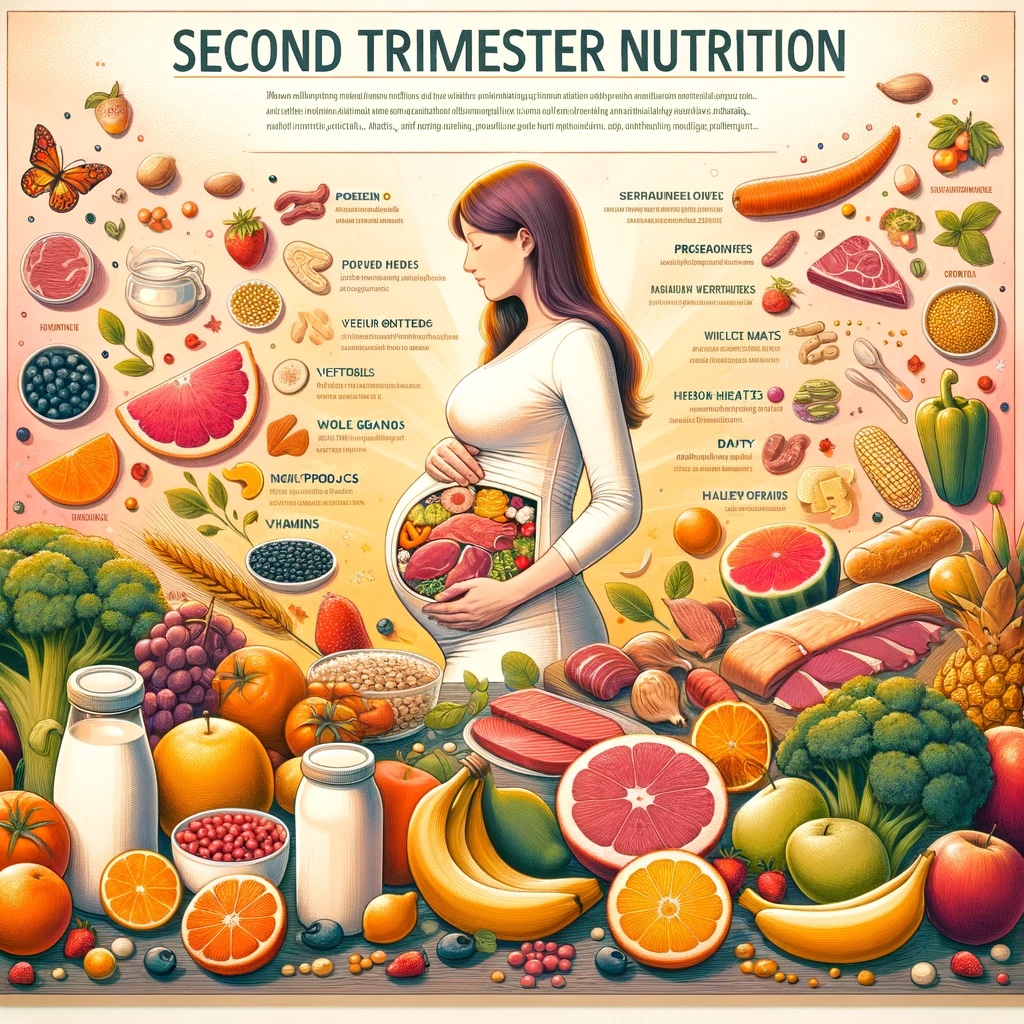
Embracing the Second Trimester
Congratulations on reaching the second trimester! This phase is often marked by renewed energy and noticeable baby growth. It’s a critical time for fetal development, and your nutrition plays a key role in ensuring both your well-being and your baby’s health.
Detailed Nutritional Needs for the Second Trimester
As your baby grows, your body’s nutritional demands change. Here’s what to focus on:
- Protein: It’s crucial for the development of your baby’s brain and organs. Aim for 75-100 grams per day. Quality sources include chicken, turkey, lean beef, eggs, dairy products, legumes, tofu, and quinoa.
- Iron: The demand for iron increases significantly. Iron is essential for the development of the placenta and fetal growth. Include iron-rich foods like spinach, lentils, fortified cereals, and lean meats. Pairing these with vitamin C-rich foods can enhance absorption.
- Calcium and Vitamin D: These nutrients work in tandem to support the baby’s bone and teeth development. Dairy products, fortified plant-based milks, green leafy vegetables, and small amounts of sun exposure are excellent sources.
- Omega-3 Fatty Acids: Particularly DHA, is essential for the baby’s brain and eye development. Fatty fish like salmon and sardines, flaxseeds, and chia seeds are rich in omega-3s.
Caloric Needs and Weight Management
An additional 300-350 calories per day are generally recommended during the second trimester. These should come from nutrient-dense foods. However, it’s not just about quantity; the quality of calories matters significantly. Opt for whole foods over processed ones.
Navigating Common Dietary Challenges
- Gestational Diabetes: This condition is characterized by high blood sugar levels during pregnancy. Managing your carbohydrate intake, focusing on high-fiber, low-glycemic index foods like whole grains, legumes, and most fruits, can help control blood sugar levels.
- Heartburn and Indigestion: As your uterus expands, it may press against your stomach, leading to heartburn. Eating smaller, frequent meals, avoiding spicy or fatty foods, and not lying down immediately after eating can help.
- Constipation: A common issue due to hormonal changes and iron supplements. Increase your fiber intake with foods like whole grains, fruits, vegetables, and legumes. Hydration is equally important, as is regular physical activity.
A Closer Look at Balanced Diets
- Fruits and Vegetables: Aim for at least 5 servings per day. They provide essential vitamins, minerals, and fiber.
- Whole Grains: Sources like brown rice, whole wheat bread, and oatmeal offer sustained energy and are rich in fiber.
- Lean Proteins: These are vital for fetal development. Including a variety of sources ensures a good intake of essential amino acids.
- Healthy Fats: Avocados, nuts, seeds, and olive oil provide essential fatty acids crucial for your baby’s brain development and help in the absorption of fat-soluble vitamins.
Snacking Smartly
Healthy snacks are great for managing hunger and boosting overall nutrient intake. Consider snacks like Greek yogurt with berries, apple slices with almond butter, or a handful of mixed nuts.
Physical Activity for a Healthy Pregnancy
Unless advised otherwise, moderate exercise like brisk walking, prenatal yoga, or swimming is excellent for your physical and mental health. Regular exercise can help manage weight, improve sleep, and reduce pregnancy-related discomforts.
Mental and Emotional Well-being
Pay attention to your mental health. Pregnancy can be an emotional rollercoaster. Practices like meditation, prenatal yoga, and adequate sleep can be incredibly beneficial.
Consultation and Personalization
It’s vital to consult with your healthcare provider to personalize your nutrition plan, especially if you face specific health challenges or dietary restrictions.
Looking Ahead: The Third Trimester
Our next post will delve into the nutritional considerations for the third trimester, focusing on preparing for delivery and supporting the final stages of fetal growth. Stay with us as we continue to explore the journey of pregnancy nutrition, guiding you towards a healthy and joyful pregnancy experience.
10 FAQs for Second Trimester Nutrition
- How much protein should I consume in the second trimester?
- Aim for 75-100 grams of protein per day. Include diverse sources like lean meats, dairy, legumes, and tofu.
- What are the best sources of iron during pregnancy?
- Opt for spinach, lentils, fortified cereals, and lean meats. Combining these with vitamin C-rich foods can enhance iron absorption.
- Do I need to increase my calorie intake in the second trimester?
- Yes, an additional 300-350 calories per day are generally recommended to support your baby’s growth.
- How can I manage gestational diabetes through diet?
- Focus on high-fiber, low-glycemic index foods like whole grains and legumes. Monitor carbohydrate intake and consult your healthcare provider.
- What foods should I eat to prevent constipation?
- Increase your fiber intake with whole grains, fruits, vegetables, and legumes. Also, stay hydrated and engage in regular physical activity.
- Are there any specific vitamins I should focus on during this trimester?
- Focus on calcium and vitamin D for fetal bone development, and omega-3 fatty acids for brain development.
- How can I deal with heartburn during pregnancy?
- Eat smaller, more frequent meals, avoid spicy/fatty foods, and do not lie down immediately after eating.
- What kind of snacks are suitable for the second trimester?
- Nutrient-dense snacks like Greek yogurt, nuts, fruits, and whole-grain crackers are great options.
- Is it safe to exercise during the second trimester?
- Moderate exercise like brisk walking, prenatal yoga, or swimming is generally safe, but always consult your healthcare provider.
- How important is emotional well-being during this trimester?
- Very important. Engage in stress-relieving activities and seek support to navigate the emotional changes of pregnancy.
Blog Tags for the Post
Pregnancy Nutrition, Second Trimester, Healthy Eating, Fetal Development, Maternal Health, Balanced Diet, Pregnancy Diet, Gestational Diabetes, Prenatal Care, Pregnancy Wellness










[…] 👉 Dive deeper into second trimester nutrition tips. […]